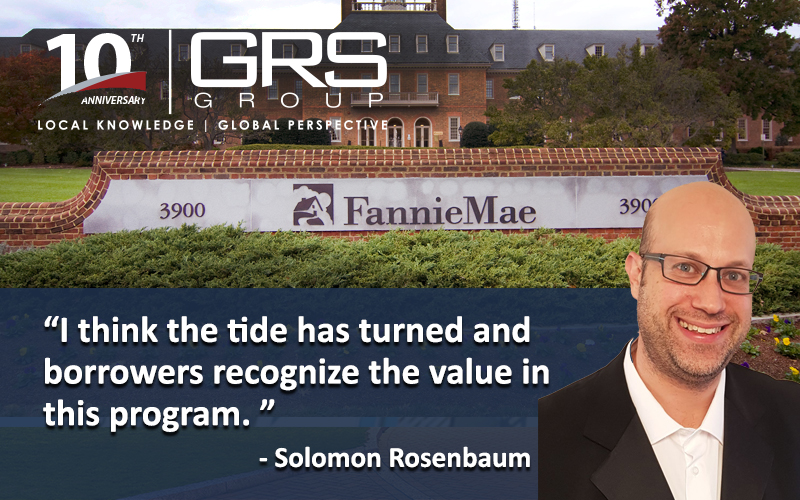Sol Rosenbaum PE, CEM, CPMP is director of Green & Energy Services at GRS Group. He can be reached at (443) 320-0429 or by email at [email protected]
The plan was really quite simple: Invest in energy or water savings, get a lower loan rate and an increase in potential loan proceeds. That is, until FHFA adjusted the green program qualification requirements as of January 1, 2019. Once those rules went into effect, there were a lot of questions from the borrowers . . .
Was the program still worthwhile?
How much money will I need to invest to gain the interest rate reduction?
We used to comply with just water savings; will the minimum energy savings requirement raise the cost per unit significantly?
Well, Fannie Mae ran the numbers and they found that while the per unit cost will likely increase for most borrowers under the new rules, the increase was not quite as significant as some feared. What the numbers showed was that this was still a great deal and investing in the energy and water savings measures easily paid for itself through the lower loan rate.
However, borrowers still showed a lot hesitancy and Fannie Mae responded by changing their reimbursement scheme. Fannie Mae had previously reimbursed the borrower the cost of the energy audit only if the loan closed as a Fannie Mae green loan. At the end of March, they put in place a temporary change to that plan which would reimburse the cost of the energy audit as long as the borrower closed with Fannie Mae.
Following this announcement, we saw an explosion of Green Rewards projects. Interestingly, this change in their scheme seemed to have woken up the market in general since we saw a large increase in Freddie Mac’s green program as well.
In mid-May, Fannie Mae extended this reimbursement plan through the end of June.
On our provider call on Wednesday afternoon, Fannie Mae announced that they will not be extending this reimbursement plan. As of July 1, 2019, they will return to the standard plan of reimbursing the energy audit cost only if the borrower closes a Fannie Mae green loan.
So how will this affect the market?
Time will tell, but I think the tide has turned and borrowers recognize the value in this program. They realize that the money they spend on the energy audit is a worthwhile risk to determine if they qualify for the program at a reasonable cost per-unit rate. As long as lenders continue to offer a decent reduction in loan rate for going green, then I do not think the reimbursement change will affect interest in this program.
If you are on the fence and can’t decide if this program is right for you, GRS Group has created a pre-qualification review process. By providing some initial information, GRS Group can assess the general cost range of the property in question. While we can’t give absolute answers without a full site assessment and review of the utility data, the pre-qualification process can help set expectations for the program.
Have questions? Want to know more?
Please reach out to your GRS Group representative or send me at email at [email protected]
About GRS Group
GRS Group is a leading provider of commercial real estate (“CRE”) services worldwide. With offices across the United States, Europe, and affiliates around the globe, GRS Group provides local market knowledge with a global perspective for institutional real estate investors, occupiers and lenders worldwide. The GRS Group team has evaluated and advised on over $1 trillion in CRE transactions.
Through the company’s proprietary management process, Global Services Connection, GRS Group delivers an integrated suite of services including Financial Advisory, Transaction Management, Assessment and Title Insurance. We provide a single point of contact, capable of leveraging the GRS Group portfolio of companies and delivering customized solutions to assist our clients in achieving their investment goals.

